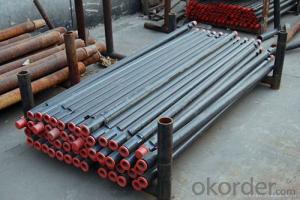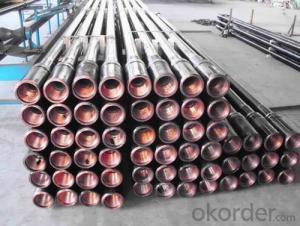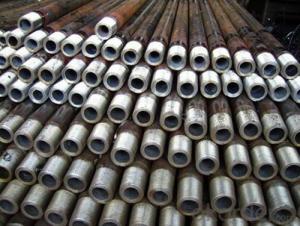Water Well Drill Pipe with API Spec 5DP Standard
- Loading Port:
- Tianjin
- Payment Terms:
- TT OR LC
- Min Order Qty:
- 1 m.t.
- Supply Capability:
- 1000 m.t./month
OKorder Service Pledge
OKorder Financial Service
You Might Also Like
1. Structure of Water Well Drill Pipe Description
We can supply all kinds of drill pipes that are consistent with API SPEC 5DP. Advanced drill pipe production lines can transfer the welding parameters to the best position to ensure the quality of welding zone; the heat treatment process with the feature of internal and external cooling at the same time can make a more reliable and stable mechanical character. Application of automatic weight, length measurement and automatic spray records can ensure products' traceability. Application of thickening and heating lines and 1250 tons of upsetting machine can ensure the thickening size meet the standard of API SPEC 5DR Using of CN furnace for whole pipe body heating and quenching, tempering machine's advanced heat treatment process can ensure the pipe's mechanical character. Tube hydraulic straightening machine ensures the straightness and coaxiality of pipe body.
SPEC: Φ73x9x(9.5/6.1)m Pipe body material: DZ40、DZ50、R780、G105
SPEC: Φ89x10x(9.5/6.1)m Tool joint material: 40Cr、45Mn2、35Crmo、4137H
2. Main Features of Water Well Drill Pipe
1) Advanced test for quality
2) MTC provided
3) API Standard
3. Water Well Drill Pipe Images
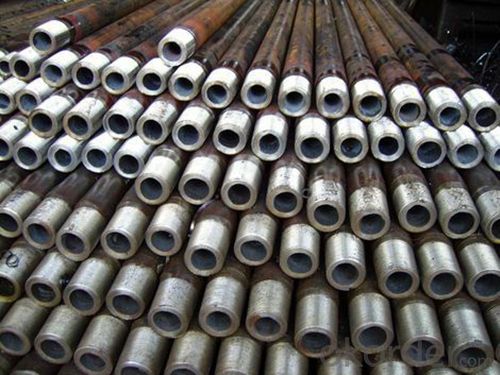
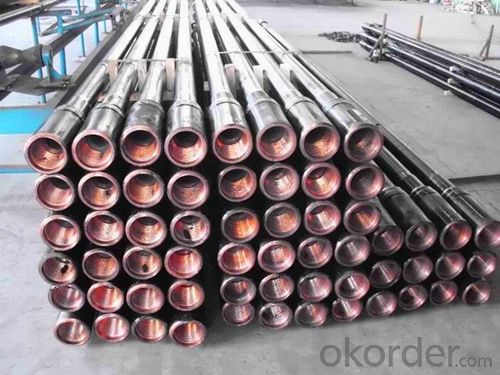
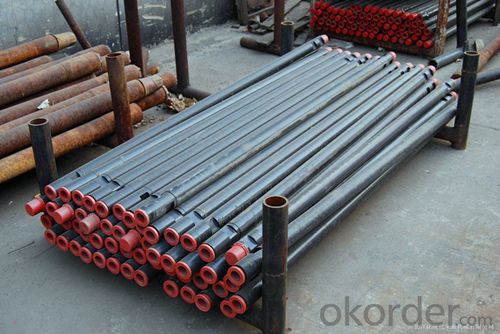
4. Water Well Drill Pipe Specification

5. FAQ of Water Well Drill Pipe
We have organized several common questions for our clients,may help you sincerely:
①How about your company?
One of the leading manufacturers and suppliers specializing in drill pipe products in China, mainly offering drill pipes including oil drill pipe, water well drill pipe, flat drill pipe, geological drill pipe and non-dig drill pipe.
Other than drill pipes we are also capable of supplying a wide variety of pipeline accessories, drill joints, steel pipe fittings, valves etc. consists of our one-stop sales. The integrated sales & service ensures customers with various demands an easier access for purchasing management.
②How to guarantee the quality of the products?
We have established the international advanced quality management system,every link from raw material to final product we have strict quality test;We resolutely put an end to unqualified products flowing into the market. At the same time, we will provide necessary follow-up service assurance.
③How long can we receive the product after purchase?
In the purchase of product within three working days, We will arrange the factory delivery as soon as possible.
- Q:What are the different standards for steel pipes?
- There are several different standards for steel pipes that are used to ensure quality and compatibility in various applications. Some of the most commonly used standards include: 1. ASTM (American Society for Testing and Materials): ASTM standards are widely used in the United States and provide specifications for various types of steel pipes, including seamless and welded pipes. These standards cover dimensions, mechanical properties, and general requirements for steel pipes. 2. API (American Petroleum Institute): API standards are specifically designed for oil and gas industry applications. These standards provide guidelines for the manufacturing, testing, and inspection of steel pipes used in the oil and gas exploration, production, and transportation sectors. 3. DIN (Deutsches Institut für Normung): DIN standards are widely used in Europe and provide specifications for various steel pipe types, including seamless, welded, and cast iron pipes. These standards cover dimensions, materials, and technical delivery conditions for steel pipes used in various industries. 4. BS (British Standards): BS standards are widely used in the United Kingdom and cover specifications for steel pipes used in construction, engineering, and other applications. These standards provide guidelines for dimensions, materials, and manufacturing processes for steel pipes. 5. JIS (Japanese Industrial Standards): JIS standards are widely used in Japan and cover specifications for various steel pipe types, including seamless, welded, and cast iron pipes. These standards provide guidelines for dimensions, materials, and technical delivery conditions for steel pipes used in various industries. 6. ISO (International Organization for Standardization): ISO standards are recognized globally and provide specifications for steel pipes used in various industries. These standards cover dimensions, materials, testing, and quality control requirements for steel pipes. It is important to note that different industries and applications may have specific requirements, and therefore, it is essential to refer to the relevant standard for each specific use case. Adhering to these standards ensures the safety, reliability, and compatibility of steel pipes in their respective applications.
- Q:How is the steel pipe dance installed at home?
- Perforated steel pipe, is very troublesome, need support to the roof and drilling in the room, the bottom with tripod frame fixed nail, and welding, installation is very troublesome;
- Q:What is a tight steel tube?
- JDG pipe is the replacement of traditional PVC and SC pipes and other traditional wire conduits. It is a breakthrough in the field of building electrical field using new materials and technologies. The JDG pipe adopts the cross connecting ground wire of galvanized steel pipe and thin-wall steel pipe, overcomes the defects of complicated construction and large construction loss of common metal pipe, and solves the problems of poor fire resistance and difficult grounding of PVC pipe. Because the JDG pipe material is more expensive than the ordinary pipe material, it is more used in the construction, such as comprehensive wiring, fire protection wiring and so on.
- Q:How are steel pipes coated to prevent corrosion?
- To prevent corrosion, steel pipes can be coated using different methods and materials. One common approach is to apply a protective layer of paint or epoxy on the pipe's surface. This coating acts as a barrier between the steel and the external environment, preventing direct contact with moisture and corrosive substances. Another technique involves galvanization, where the steel pipes are coated with a layer of zinc. Zinc is highly resistant to corrosion and acts as a sacrificial anode. In case of any damage to the coating, the zinc corrodes instead of the steel, ensuring the steel remains intact and free from corrosion. Polyethylene or polypropylene materials can also be fused onto the steel surface, creating a strong bond that provides excellent resistance against corrosion. This method, known as fusion bonding, is commonly used in offshore and underground pipelines. Moreover, a layer of corrosion-resistant alloy can be applied to the steel pipe. This alloy is typically a combination of metals such as nickel, chromium, and molybdenum, which offer superior protection against corrosion in harsh environments. The choice of coating method depends on factors like operating conditions, the presence of corrosive substances, and the expected lifespan of the steel pipes. By effectively applying these coatings, steel pipes can be safeguarded against corrosion, extending their durability and ensuring the integrity of the infrastructure they are used in.
- Q:Can steel pipes be used for oil and gas well production?
- Yes, steel pipes can be used for oil and gas well production. Steel pipes are commonly used in the oil and gas industry due to their high strength and durability, which allows them to withstand the harsh conditions of drilling and production processes. Additionally, steel pipes can efficiently transport oil and gas over long distances, making them a preferred choice in the industry.
- Q:Can steel pipes be used for the construction of tunnels?
- Yes, steel pipes can be used for the construction of tunnels. Steel pipes are commonly used in tunnel construction for various purposes such as drainage, ventilation, and utility installations. They are strong, durable, and can withstand high pressures and loads, making them suitable for tunnel applications. Additionally, steel pipes can be easily fabricated, installed, and maintained, making them a popular choice in tunnel construction projects.
- Q:How to distinguish seamless pipe and welded pipe?
- If it is seamless pipe, the port can be seen inside and outside the pipe there is no welding meat exists, and even if the welding pipe welding processing, the pipe weld is very easy to observe.
- Q:What are the potential health hazards associated with steel pipe installation?
- Some potential health hazards associated with steel pipe installation include exposure to hazardous chemicals used in the coating or treatment of the pipes, inhalation of dust or fumes generated during cutting or welding, and physical injuries due to accidents or mishandling of heavy equipment. Additionally, improper handling or disposal of waste materials and contaminated water can pose environmental health risks. It is important to follow proper safety protocols, use personal protective equipment, and ensure proper ventilation and waste management to mitigate these hazards.
- Q:Are steel pipes suitable for underground chemical transport?
- No, steel pipes are not suitable for underground chemical transport as they can corrode and react with certain chemicals, posing safety risks and potentially contaminating the transported substances.
- Q:What are the advantages of using steel pipes in the manufacturing of appliances?
- There are several advantages of using steel pipes in the manufacturing of appliances. Firstly, steel pipes are extremely durable and can withstand high pressures, making them ideal for applications that require strength and resilience. Secondly, steel pipes have excellent corrosion resistance, ensuring that the appliances will last longer without succumbing to rust or degradation. Additionally, steel pipes have a smooth interior surface, which minimizes friction and allows for efficient flow of fluids or gases within the appliances. Lastly, steel pipes are readily available and cost-effective, making them a practical choice for appliance manufacturers.
1. Manufacturer Overview |
|
|---|---|
| Location | |
| Year Established | |
| Annual Output Value | |
| Main Markets | |
| Company Certifications | |
2. Manufacturer Certificates |
|
|---|---|
| a) Certification Name | |
| Range | |
| Reference | |
| Validity Period | |
3. Manufacturer Capability |
|
|---|---|
| a)Trade Capacity | |
| Nearest Port | |
| Export Percentage | |
| No.of Employees in Trade Department | |
| Language Spoken: | |
| b)Factory Information | |
| Factory Size: | |
| No. of Production Lines | |
| Contract Manufacturing | |
| Product Price Range | |
Send your message to us
Water Well Drill Pipe with API Spec 5DP Standard
- Loading Port:
- Tianjin
- Payment Terms:
- TT OR LC
- Min Order Qty:
- 1 m.t.
- Supply Capability:
- 1000 m.t./month
OKorder Service Pledge
OKorder Financial Service
Similar products
New products
Hot products
Related keywords
